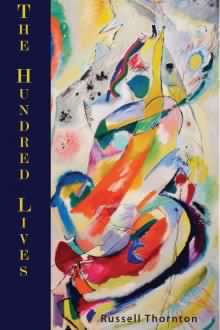
Russell Thornton’s collection The Hundred Lives (2014) was shortlisted for the Griffin Poetry Prize. His Birds, Metals, Stones & Rain (2013) was shortlisted for the Governor General’s Literary Award for Poetry, the Raymond Souster Award and the Dorothy Livesay Poetry Prize. His other titles include The Fifth Window (2000), A Tunisian Notebook (2002), House Built of Rain (2003; shortlisted for the Dorothy Livesay Poetry Prize and the ReLit Award for poetry), The Human Shore (2006), The Broken Face (2018), Answer to Blue (2021), and The White Light of Tomorrow (2023). Thornton won the League of Canadian Poets National Contest in 2000 and The Fiddlehead magazine’s Ralph Gustafson Prize in 2009. His poetry has appeared in several anthologies and as part of BC’s Poetry in Transit. He lives in North Vancouver.

Judges’ Citation
The poems in The Hundred Lives burn with a rare blend of rhythmic intensity and hard-earned experience that make them at once timeless and contemporary; on page after page, in line after line, we hear the ancient, communal music of language sung through a consciousness of maturity, loss, and restless spiritual hunger.
The poems in The Hundred Lives burn with a rare blend of rhythmic intensity and hard-earned experience that make them at once timeless and contemporary; on page after page, in line after line, we hear the ancient, communal music of language sung through a consciousness of maturity, loss, and restless spiritual hunger. In a very real sense, Thornton’s lyric narratives and dialogues – of travel, of Lazarus and the Song of Songs, of romantic love – dramatically enact Robert Frost’s notion that the greatest of all attempts is ‘to say matter in terms of spirit, or spirit in terms of matter, to make the final unity’. Thornton speaks with utter conviction and credibility to forge a personal vision, a ‘pathway through the apple’, to an always-richer understanding of human experience. Whether the poems take us to Greece, where gypsy women move ‘like living tarot in the street’, or to the memory of a beloved grandmother ‘out in the sailing ship of her wedding dress. Her ashes’, always The Hundred Lives puts us in intimate touch with ‘first fire, first waters’, with the tenderness and pain of vital engagement.
Selected poems
by Russell Thornton
I threw away your letters.
Years ago, just like that.
The tight black swirls,
circles and strokes
filling fine sheets —
I would not see them again.
The last items I had left.
The dates. The phrases.
The things you said. Forfeited.
Snowflake patterns.
Leaf diagrams.
Crushed. Melted. Dissolved.
The flooding runoff
at the backed-up
street corner drain
collects it all.
Only the opening
of a strong seal far below
could allow that pool
of darkening rainwater
to run and drop away
between the slats.
If I were to recover
the lost key of the cursive,
I would in one instant
want back again what I saw
in the images
the hand traced out for me.
And would be denied
even the little
the letters kept of you
and be released
into nothing but more time.
Copyright © 2014 by Russell Thornton, The Hundred Lives, Quattro Books
Letters
Anniversaries circle round again. My grandparents
marrying in the sun. The guests in their best attire.
The filled vaulted room. Then the clinking glasses.
Then the private rites of those who waited long.
It is there in the light. Light that is a window.
And is a mirroring seas for my grandmother
out in the sailing ship of her wedding dress. Her ashes.
Someone I loved dying alone. The month the wide frame
of her final leaving. It was also her birth month. Light
opens its window, and is window upon window.
Her living hair darkens beyond its living black.
That black is another light, no visible sun
burning in its origins but a dark transparency,
and it arrives like another her, again and again.
I too am a window. In August, two people
among the dead look out of it. They do not know
the window is me. And I am what a window can wish.
To open endlessly because it is light,
and because it is a mirror, let the silver erase itself
and arrive and wait flawless on the glass,
and darken, and erase itself, like life, like death.
Copyright © 2014 by Russell Thornton, The Hundred Lives, Quattro Books
Anniversaries, End of August
Once, I would make certain my name
did not appear in any directory. Now
I dream I am back in different times and places,
and the people I remember I loved
are not there, and the places not at all
as they were, and it is as if I have belonged
to some underground organization
set up to allow no member
to betray another – no member ever
knowing who his associates actually are.
Now I agree to be listed, I ask to be listed –
and hope that this will make it easy to find me.
And now I dream of a list. On it
everything I and those I have been with
have ever truly felt or done is recorded
in the clearest detail. In the same dream
is a man who walks alongside me and knows
nothing but the entire list by heart,
and will recite it to the moment I die,
and then he too will disappear.
Copyright © 2014 by Russell Thornton, The Hundred Lives, Quattro Books
A List
- Q&A with Russell Thornton Victoria Festival of Authors
- The mystery of where you come from: An interview with Russell Thornton Read Local BC
- Russell Thornton and Phoebe Wang in Conversation EVENT Magazine